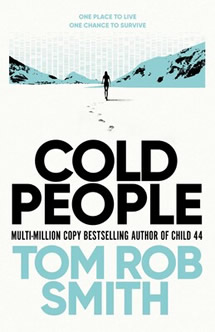Reviewed by Robert Goodman.
By Tom Rob Smith, Simon and Schuster, $32.99.
 There is an aphorism that every person has a novel in them. There perhaps should be a new aphorism that every novelist also has a post-apocalyptic or dystopian novel in them. Plenty of ‘mainstream’ novelists have tried this genre on recently (most with limited success) including Derek Miller (Radio Life), Robert Harris (The Second Sleep), Inga Simpson (The Last Woman in the World) and Noah Hawley (Anthem). For Tom Rob Smith, known for his series of historical Russian thrillers which started with his breakout debut Child 44, that novel is Cold People.
There is an aphorism that every person has a novel in them. There perhaps should be a new aphorism that every novelist also has a post-apocalyptic or dystopian novel in them. Plenty of ‘mainstream’ novelists have tried this genre on recently (most with limited success) including Derek Miller (Radio Life), Robert Harris (The Second Sleep), Inga Simpson (The Last Woman in the World) and Noah Hawley (Anthem). For Tom Rob Smith, known for his series of historical Russian thrillers which started with his breakout debut Child 44, that novel is Cold People.
Cold People opens with a couple of historical vignettes about Antarctica before moving to the present day. Medical student Liza is on holiday with her family in Portugal where she meets-cute local fisherman Atto. The two form an instant bond which is immediately tested when aliens arrive in the skies and give humanity an ultimatum: humankind has 30 days to migrate to Antarctica or die. The bulk of the narrative is the story of this journey and then of the survivors, twenty years on from this event, eking out an existence on the most inhospitable continent on Earth and trying to find new ways to survive. About two thirds of the way through this section the narrative becomes something else again.
It is hard to know what to make of Cold People. The narrative rarely stays with one character long enough for readers to become invested. Every character is introduced with the story of how they survived the invasion. So that even close to the end of the book, Smith is still introducing new characters with multi-page backstories about the day of the invasion before moving back to the action. The premise of an alien invasion is never really explored, the aliens are never seen and the reason for sending humankind to Antarctica is only ever assumed. It is the deus ex machina that drives the plot but to no particular end.
If Cold People is about anything it is an exploration of humanity’s will to survive. In particular, what steps we might take if pushed, literally to an extreme. And what then happens when the cure might be worse than the disease. But it is unclear why the whole alien invasion was required. If this was the story Smith wanted to tell there were possibly more elegant and less contrived ways of getting there. In his short story Beneath Sunlit Shallows (found in the recent collection Flight from the Ages) science fiction author Derek Künsken provides a much more economical, nuanced and effective exploration of this issue.
In the end though, where Cold People falls down is in its failure to deliver an engaging, propulsive narrative to drive its ideas. Smith has shown he can write thrillers but he brings none of those techniques to Cold People which is heavy on exposition and light on surprises or revelations.
Over 900 more reviews can be found on Pile by the Bed.


